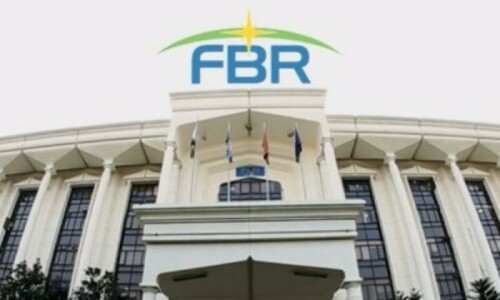AFTER setting a massive revenue target for the Federal Board of Revenue for the next fiscal year, the government seems to be building pressure on the tax authority to perform. It is just as well that this may lead to a tightening of the net around those who have so far managed to evade the taxman.
A day after another massive shakeup in the FBR, which reportedly saw the transfer of dozens of officers of the Inland Revenue Service and Customs Groups, and with more transfers and postings of senior officers expected over the weekend, the tax authority was told to immediately go after the around 4.5m citizens it had identified, which it thinks are liable to pay taxes but do not. The prime minister is also reportedly overseeing an accelerated action plan to digitise and reform the FBR, along with a review of its existing and required resources. These are all positive signs.
Reportedly, Prime Minister Shehbaz Sharif is serious about cracking down on corruption within the FBR, introducing a merit-based culture, and reforming the institution. Worryingly, however, he has involved two intelligence agencies, according to a report in local media, to ‘assist’ him in the task of identifying and penalising FBR officials.
Time will tell how successful this strategy will prove. The FBR has generally proven to be a difficult nut to crack for most past governments, with efforts to reform it invariably encountering resistance as soon as certain thresholds begin to be crossed. That said, it is clear to all and sundry that Pakistan’s economic viability depends on the Board’s ability to extract revenue in line with government policies and that the room for failure is no longer there. With the ongoing economic crisis, the need for a diligent tax authority has become an existential necessity for Islamabad.
The FBR’s operational competencies aside, the fiscal policies, as outlined in the budget, have set it up for another huge challenge. It can expect to be reminded very soon that taxation is just as much a political issue as it is a fiscal concern. The FBR may begin executing the tax directives more diligently than before, but how will the government react when the various ‘protected’ classes once again begin agitating against its tax drives?
Not only that, the salaried classes, usually a lot easier to control, also seem to be in a black mood. Discussions on various social forums these days are increasingly turning to questions about why they should pay so much in taxes and if it isn’t more sensible to be operating off the books. This is a dangerous sign for a government battling a crisis of legitimacy. How delicately and firmly it handles discontent will make or break its tax plans.
Published in Dawn, July 8th, 2024













































Dear visitor, the comments section is undergoing an overhaul and will return soon.